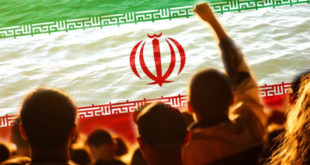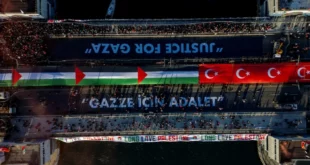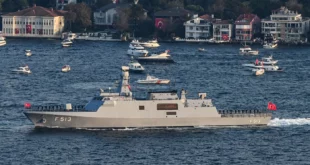 TEHRAN (AP) — Tehran’s arch-conservative mayor capped a stunning political rise Saturday to claim second place in Iran’s presidential race and face one of the nation’s most famous statesmen in a head-to-head vote.
TEHRAN (AP) — Tehran’s arch-conservative mayor capped a stunning political rise Saturday to claim second place in Iran’s presidential race and face one of the nation’s most famous statesmen in a head-to-head vote.
Mayor Mahmoud Ahmadinejad — a 49-year-old former student radical backed by Iran’s ruling clerics and their military guardians — was considered a long-shot challenger in Friday’s election. But he rode his popularity among Iran’s hardline factions and key groups such as the elite Revolutionary Guards.
One rival, former parliament speaker Mahdi Karroubi, accused Islamic vigilantes and soldiers of “intimidating” voters to back Ahmadinejad — who slipped past Karroubi 19.48 per cent to 19.3 per cent. Karroubi’s aides demanded an official probe and warned they could unleash street demonstrations.
Karroubi’s campaign chief, Ali Akbar Montashamipour, said any signs of military interference in politics will make “people rise up against the establishment.” The winner, political veteran Ayatollah Hashemi Rafsanjani, was left shaken with just slightly more than 21 per cent of the vote. He will face Ahmadinejad next Friday in Iran’s first run-off election. Neither candidate cleared the 50 per cent threshold for a first round victory.
The results also suggested significant shifts under way in Iran — with conservatives reclaiming more ground and liberals worrying more about jobs and foreign policy leadership than the fight for greater social freedoms.
The top pro-reform candidate, former culture minister Mostafa Moin, was humbled by a distant fifth place finish.
Moin, considered the political heir of outgoing President Mohammad Khatami, was billed as Rafsanjani’s most credible rival.
But his bid was steamrolled by conservatives at the polls despite a respectable 62.7 turnout defied a boycott drive by groups opposing the Islamic system — which comprised a strong part of Moin’s bloc.
“Our failure… doesn’t mean reforms have come to an end or Iran doesn’t need change,” said Elaheh Koolaee, a top aide for Moin.
The snub, said Tehran-based political analyst Reza Fathi, was also a parting shot to Khatami’s eight years in office.
Khatami managed to lift many of the social restrictions imposed after the 1979 Islamic Revolution such as bans on dating and Western music. But he failed in his main missions: To weaken the all-powerful controls of the theocracy and improve the stumbling economy. Despite vast oil and gas wealth, many people earn less than $2,000 a year, inflation runs above 20 per cent and some analysts place the jobless rate near 40 per cent.
“In the current situation of inflation and unemployment, the promise of more freedom just attracts intellectuals,” said Fathi. “That time is over.” The upcoming election duel will offer distinct choices.
Rafsanjani, 70, is a mix of political cunning and business power as nominal head of a family empire that includes an airline and a large cut of the nation’s $400 million pistachio export business. He served as president from 1989-97 — bowing out because of a two-term limit — and then moving into the inner circles of the theocracy.
He portrays himself as the most capable leader to handle Iran’s delicate negotiations with the West over its nuclear ambitions, which Washington claims is a cover for a weapons programme. Iran says it only seeks peaceful nuclear power.
Ahmadinejad draws his support from Iran’s ultra-conservative wings such as veterans of the 1980-89 war with Iraq and the civilian “basiji” militia corps with ties to ruling establishment.
He was a member of a militant student faction during the revolution and later volunteered to fight on the front lines against Saddam Hussein’s forces. He served in provincial posts in the 1990s before being appointed as mayor of Tehran in 2003 by the conservative-led municipal council.
Rafsanjani has suggested he would be open to greater dialogue with the United States. But Ahmadinejad told a news conference Saturday that he could not foresee improved ties with any country that “seeks hostility” against Iran.
He added that he supports nuclear talks with the West, but did not elaborate.
“I picked Ahmadinejad to slap America in the face,” said Mahdi Mirmalek after attending Friday prayers at Tehran University.
“I assume there will be others who will smell a rat,” said Patrick Clawson, who follows Iranian affairs at the Washington Institute for Near East Policy.
In France, several thousand people protested Iran’s presidential election Saturday at a suburban Paris rally led by an exiled Iranian opposition group that denounced the vote as a sham. The demonstrators chanted: “Mullahs, No!” The White House also denounced the election because Iran’s real power rests with the theocrats and not the elected president or parliament.
Iranian officials, however, said the comments only helped boost turnout.
“The enemy tried and failed to intimidate the people,” said Iran’s highest authority, supreme leader Ayatollah Ali Khamenei.
 Eurasia Press & News
Eurasia Press & News


